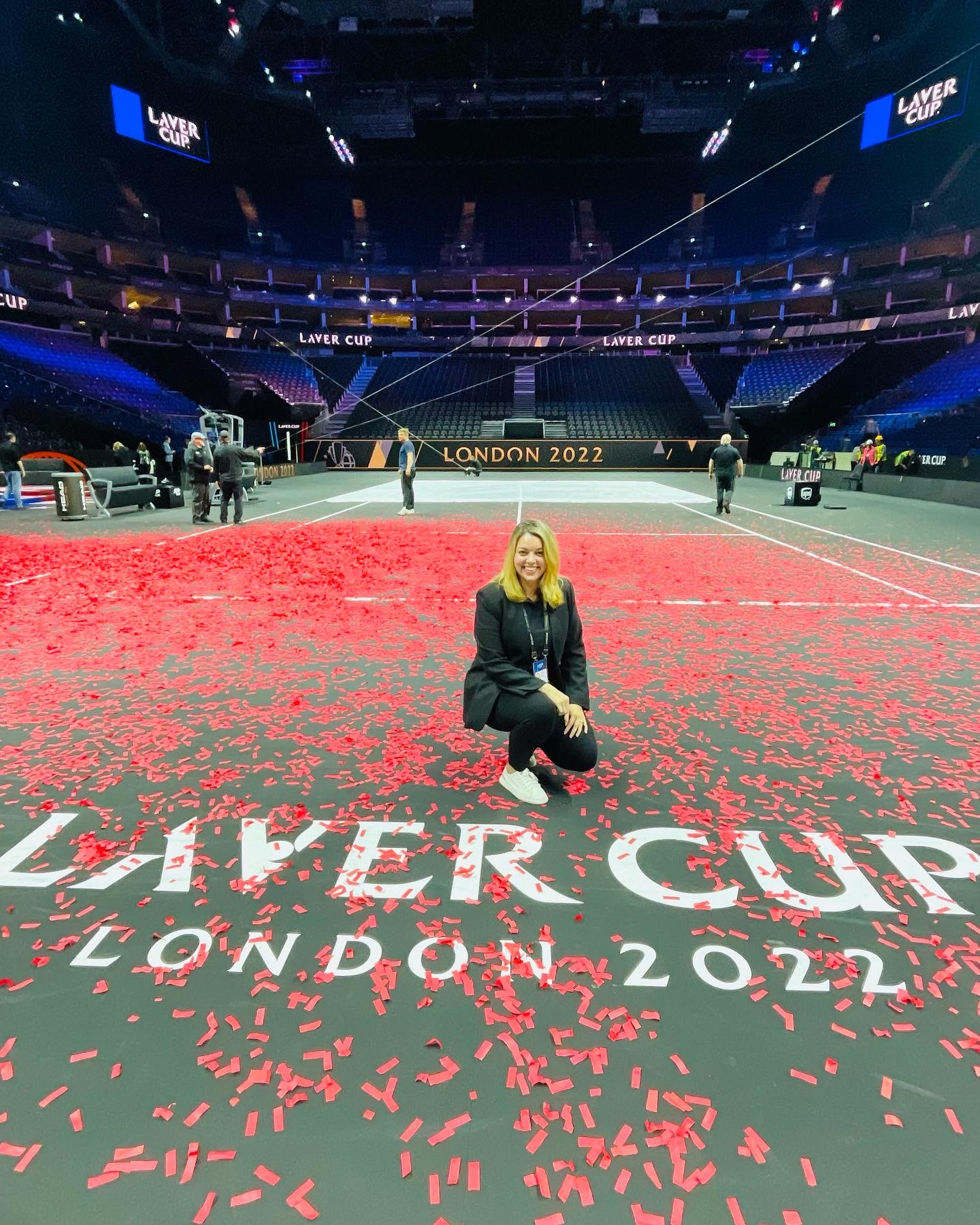Hey there event professional!
A long time ago, when I was just starting out in events, I assumed that VIPs were high level and only high level. Think…Hollywood celebs, the President, or the Queen (hello, ultimate VIP). Give me slack though because I was inexperienced.
That way of thinking manifested in unpreparedness and mistakes at events when I worked in different kinds of roles from stage managing to registration and check-in to transportation.
- “Umm hello who are you?”
- “Umm I’m not sure.”
- “Umm I didn’t really prepare for that.”
- “Umm I’ll find out.”
- “Umm I don’t know where that is.”
These phrases don’t exactly inspire confidence or provide a top tier experience. Even when I didn’t say them all out loud, I still thought them so I probably looked confused and shocked while a very important person is standing in front of me. Bad experience for guests, bad experience for me (it’s not a good experience when after every event you want to hide your head in the sand).
Moral of the story here is to prepare, don’t assume a VIP is walking around with a sign that says “I’m a VIP” (OK I know they don’t ACTUALLY do that, but I thought it would be obvious), and do my research.
My advice? Don’t be me 10+ years ago. I’ll help you. Here’s how.
Here are the 4 definitions of VIP that you need to know to work in the VIP event industry:
- VIP Person
- VIP Event
- VIP Experience
- VIP Area
Usually, we think of VIPs as people, because obviously the acronym has the word “People” in it. But we have to go deeper than that. Let’s look at each one in more detail and why they are important.
VIP – The Person
Laura’s definition: A person of notable importance within or out of the context of an event who is given special treatment
As event professionals, we can call them talent, special guests, notables, or keynote speakers. I call them champagne clients because why not?
VIPs range from celebrities and athletes to world leaders and CEOs but they also include me. They include you. It doesn’t matter if they are well known to the general public or not. At any given time, anyone can be a VIP. Ever gotten married? You were the VIP at your wedding. Ever attended a celebration of someone promoted at work? They were a VIP. Ever seen your boss take an important client out for a nice meal? That’s a VIP.
The point is, VIPs are diverse groups of people with their own needs, wants, and expectations at events.
How do we know what those things are? We start by grouping VIPs into categories. I’ve made this simple for you by already doing it! You can grab my cheat sheet for that here.
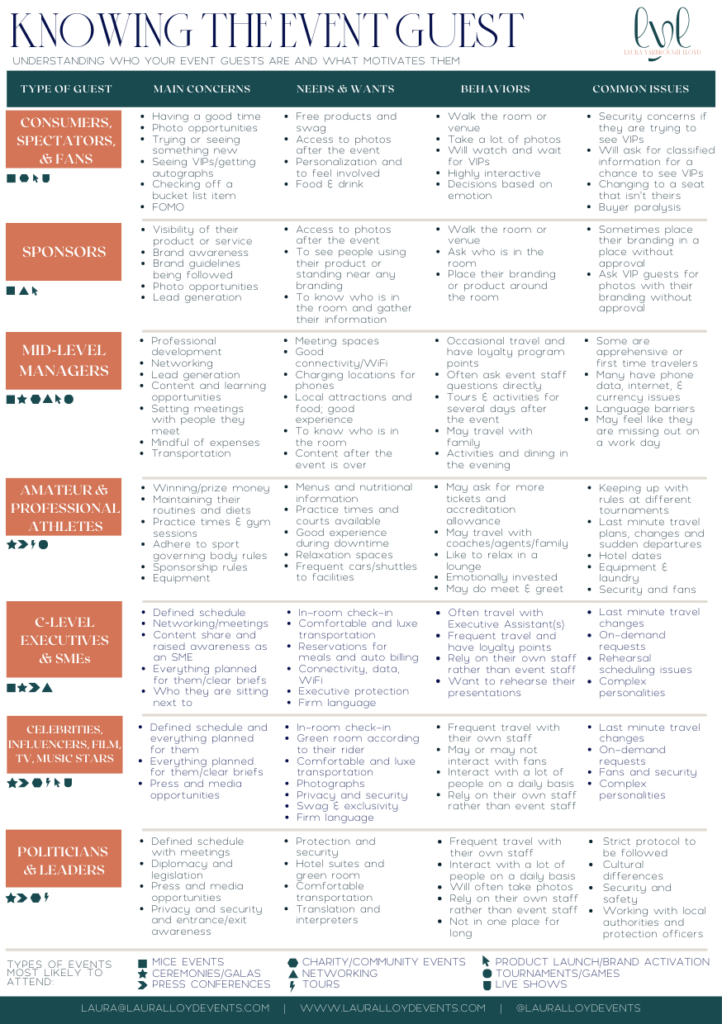
Think of an athlete. What does the athlete want at an event?
- Win – either for money, glory or a trophy
- Stay healthy – go to the gym, eat healthy food, work with a physio
- Adhere to rules – every sports governing body has rules. Break them? You could be penalised.
Compare these things to a CEO. What do they want at an event they are speaking at?
- Network – they didn’t get to the top by not networking
- Raise brand awareness – get their name and their business name out there
- Work while OOO – they need amenities to conduct business while out of office like WiFi, meeting spaces, etc.
So you see, these people aren’t the same. It’s even trickier when both of these people are at the SAME event. So you can’t approach a VIP event thinking one size fits all. Anticipate needs, do your research, and provide a top tier experience.
VIP – The Event
Laura’s definition: An event with a significant number of VIPs present
Some VIP events are iconic. The King’s Coronation (this is the ultimate VIP event in my opinion!), the Olympics, the Academy Awards, Royal Ascot, the Cannes Film Festival, Wimbledon, Coachella, and so on.
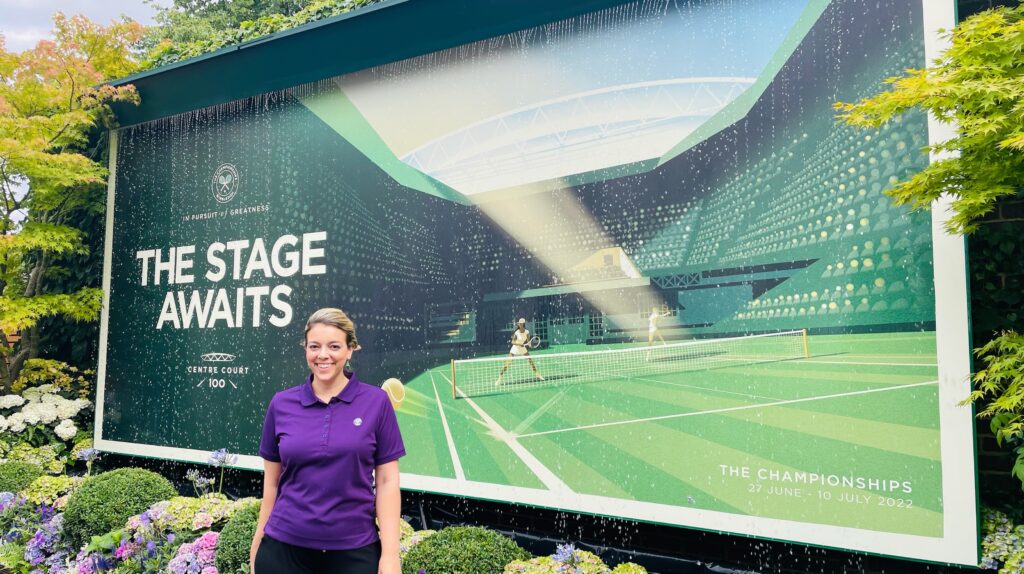
But do they all have to be iconic? Of course not. As long as there are a significant number of VIPs in attendance, it’s a VIP event. Not everyone has to be a household name VIP though. You may not recognise their face, but you may recognise their name. You may not recognise anything at all but know that they are VIPs.
So why distinguish the VIP from the VIP event? Because VIP events are a different ballgame. Not only do you have to level up your planning and preparation, you have to level up your teamwork. If you’re working your normal events and you have 1-2 VIPs coming to it, it’s not quite a VIP event so maybe you and one other person plan and manage all the things for those special guests.
But if you have a significant amount of VIPs coming, you’re probably one team of many working to make the event a success. You coordinate with security and transport, accommodation, stage management and A/V, and the hosts/hostesses at check-in.
And what about mindset? You’re faced with a lot of different personalities, some of which may be very different in person than how they are portrayed. So whatever feeling you have about them, good or bad, you have to shed. You’re there to work.
VIP – The Experience
Laura’s definition: An experience given to VIPs at events or event guests who purchase or win a special experience
There are so many ways to offer VIP experiences. Often, everyone at an event gets a VIP experience and other times only a select few as designated by the organiser or those who win or purchase a VIP experience. The key thing to remember though, you don’t have to be a typical VIP to get a VIP experience.
That’s why the VIP experience is a beautiful topic and can stand on its own. So how do you give a VIP experience?
Think of YOUR experiences. When were you treated like an absolute star and how did it make you feel? What did the person do? Were you at a hotel, a spa, a store? There are so many small touches that if you just start making note of, you can apply these to your own events.
Just as important to talk about are those who spend a significant amount of money on a VIP experience. Do you know anyone who dreams of sitting courtside at an NBA final with a meet and greet after the game? That bucket list item may be ticked off one day, and you can bet that they will remember that forever, and it’s up to you to provide that experience. Other times, VIP experiences are offered to special clients and employees as incentives. I was fortunate to be on the receiving end of one VIP experience when I went into the Paddock Club at an F1 Grand Prix (see the photos below). I’ll talk more about in a moment when I get to the last VIP definition.
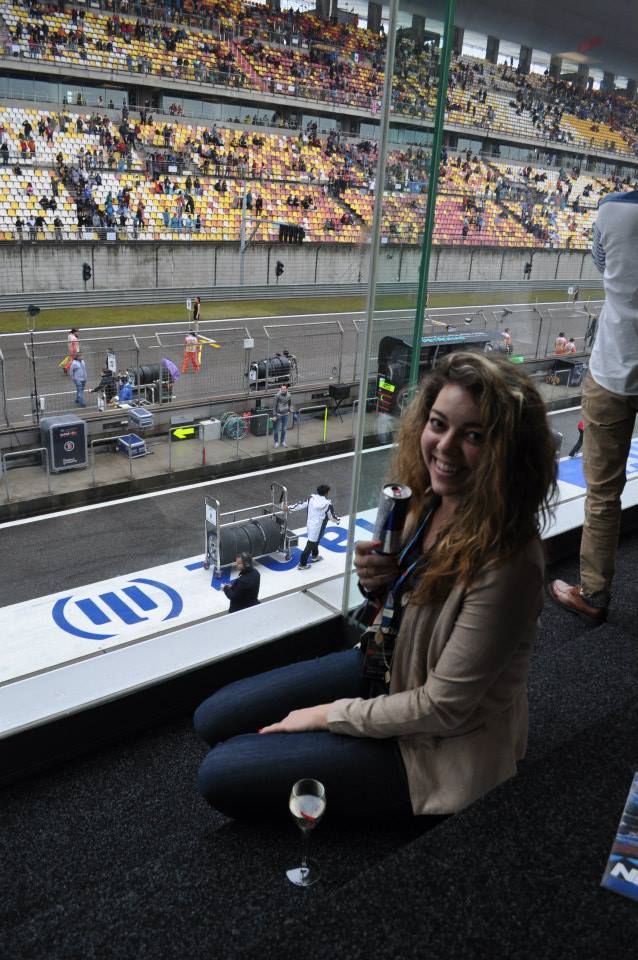
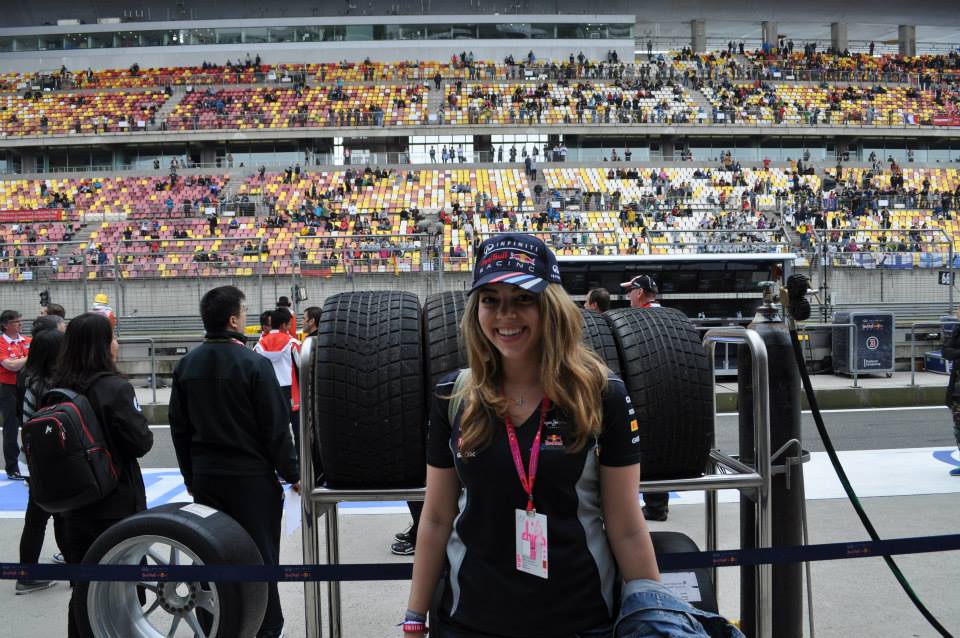
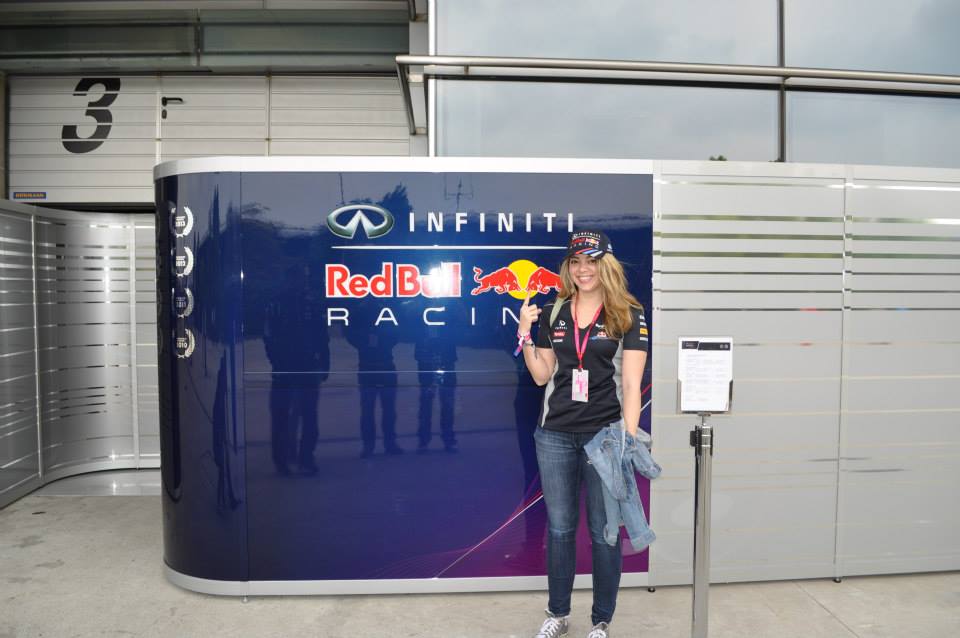
The important thing to remember is that the VIP experience can be given to anyone at any given time and something you should strive for when planning events.
VIP – The Area
Laura’s definition: An exclusive area at an event that is invite only or can be accessed by purchasing or winning a high-price pass
My favourite kinds of VIP events are those that are ticketed so you have a mix of general public and VIPs. It’s at these events you find the VIP area. What happens in the VIP area? A VIP experience.
The VIP area is a great way to get your foot in the door if you want to work at a VIP event, and there can be multiple VIP areas at event for sponsors, performers, and different brands. VIP areas, if you’ve never been in one, are a microcosm – an event within an event. All of them require a huge team from hosting, F&B, gifting, design, etc., and they are one of my favourite places to work.
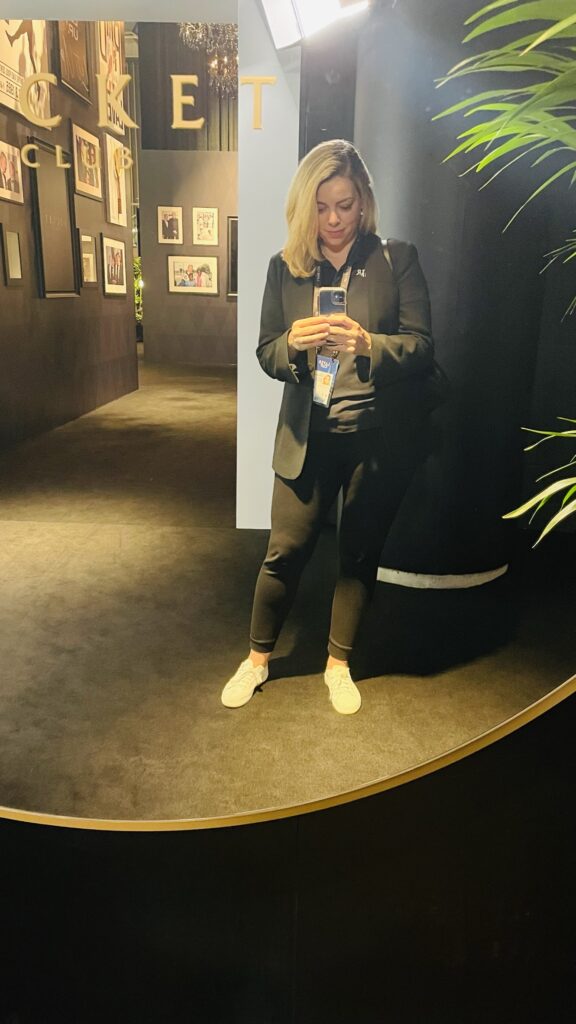
You may hear VIP areas referred to as a suite, lounge, club, box, etc. and they can be in permanent or temporary structures. The temporary structures offer the most opportunity because for that you need design, branding and build unlike the permanent structures. Often the temporary ones are made to be an experience themselves.
One time, I was fortunate enough to attend an F1 Grand Prix and enjoy the Paddock Club as a spectator and fan, not as a worker. It was in a structure built for purpose but branded in the team’s kit. It was the time of my life. Now, I’m not one spending my life’s fortune traveling the world as a Paddock Club member every weekend, but some people do. Did that matter during the one weekend that I was there? Not at all. I was treated like a VIP because I was a VIP that weekend and was in the company of well known VIPs, high net worth individuals, and some special guests of the sponsors. The best thing about the VIP area is that all guests inside are all treated equally as VIPs no matter who they are.
So what’s the point of all this?
Did you know the VIP event industry was so involved and had so many opportunities? Multiple areas, multiple types of events, different experiences, different kinds of people.
The next time you’re chatting with someone involved with a VIP event that you want to work at, bring up one of these four topics. They are gateways into the VIP event industry.
If anything, I hope you take these points away so that you can achieve your event goals whether they are to work at iconic VIP events, to manage VIPs, to create VIP experiences or to hire the right team for your VIP event:
- VIPs aren’t always obvious and different groups of VIPs want and need different things
- VIP doesn’t just mean people. It can mean events, experiences and areas as well.
- Being prepared to work directly with and around VIPs at events will make you more a better event professional and consistently get asked to work at high level events.
So, what should you do now?
Think about which area you see as a potential opening into VIP events. Managing a VIP person, event, experience or area. Take time to visualise it. Then, come on over to Instagram @lauralloydevents and message me or DM me on LinkedIn at Laura Yarbrough-Lloyd and tell me what you think of this new insight!
Check out my 1:1 program, A Flair For VIP Events™. If you apply to work with me 1:1, I’ll be your coach, mentor, event bestie, accountability partner and cheerleader for 12 weeks and beyond, leading you to book your first VIP event, re-book it, and get referred for more.
Check out this podcast episode on my podcast, A Flair for VIP Events. I dive into this topic of VIP people, events, experiences and areas.
